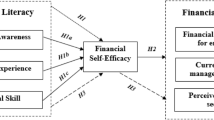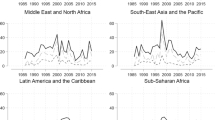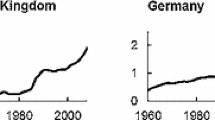Abstract
Using a randomized control trial, we evaluated the effect of a financial literacy program on the level of debt and on formal access to credit in Chile. We use a sample of beneficiaries of a publicly run micro-entrepreneurship program. We evaluated the program using administrative data with information on the debt level, interest rates, and new loans provided by the formal sector. The program tends to decreased debt level in the short run while increasing the probability of having formal debt. The program had effects in parts of the country where the take-up was higher and the implementation was smoother.
À l’aide d’un essai contrôlé aléatoire, nous avons évalué l’effet d’un programme d’éducation financière sur le niveau de la dette et sur l’accès formel au crédit au Chili. Nous avons utilisé un échantillon de bénéficiaires d’un programme de micro-entreprenariat public. De plus, nous avons évalué le programme en utilisant des données administratives, comprenant des informations sur le montant de la dette, les taux d’intérêt et les nouveaux prêts accordés par le secteur formel. Le programme a tendance à faire diminuer le niveau de la dette à court terme, tout en augmentant la probabilité d’avoir une dette formelle. Il a eu des effets dans les parties du pays où son adoption était plus élevée et la mise en œuvre était plus facile.
Similar content being viewed by others
References
Abreu, M. and Mendes, V. (2010) Financial literacy and portfolio diversification. Quantitative Finance 10(5): 515–528.
Akin, G.G., Aysan, A.F., Ozcelik, S. and Yildiran, L. (2012) Credit card satisfaction and financial literacy: Evidence from an emerging market economy. Emerging Markets Finance and Trade 48(5):103–115.
Anderson, S.J., Chandy, R. and Zia, B. (2016) Pathways to Profits.
Banerjee, A.V. and Newman, A.F. (1993) Occupational choice and the process of development. Journal of Political Economy 101:274–298.
Behrman, J.R., Mitchell, O.S., Soo, C.K. and Bravo, D. (2012) How financial literacy affects household wealth accumulation. The American Economic Review 102(3):300–304.
Blattman, C., Fiala, N. and Martinez, S. (2014) Generating skilled self-employment in developing countries: Experimental evidence from Uganda. The Quarterly Journal of Economics 129(2):697–752.
Blattman, C., Green, E.P., Jamison, J., Lehmann, M.C. and Annan, J. (2016) The returns to microenterprise support among the Ultrapoor: A field experiment in Postwar Uganda. American Economic Journal: Applied Economics 8(2):35–64.
Blattman, C. and Ralston, L. (2015). Generating employment in poor and fragile states: Evidence from labor market and entrepreneurship programs. Available at SSRN.
Bruhn, M., Karlan, D. and Schoar, A. (2010) What capital is missing in developing countries?. The American Economic Review 100(2):629–633.
Bruhn, M. and Zia, B. (2013) Stimulating managerial capital in emerging markets: The impact of business training for young entrepreneurs. Journal of Development Effectiveness 5(2):232–266.
Buera, F.J. (2009) A dynamic model of entrepreneurship with borrowing constraints: Theory and evidence. Annals of Finance 5(3–4):443–464.
Cho, Y. and Honorati, M. (2014) Entrepreneurship programs in developing countries: A meta regression analysis. Labour Economics 28: 110–130
Cole, S.A., Sampson, T.A. and Zia, B.H. (2009) Financial Literacy, Financial Decisions, and the Demand for Financial Services: Evidence from India and Indonesia. Cambridge, MA: Harvard Business School pp. 09–117.
De Mel, S., McKenzie, D. and Woodruff, C. (2014) Business training and female enterprise start-up, growth, and dynamics: Experimental evidence from Sri Lanka. Journal of Development Economics 106:199–210.
Drexler, A., Fischer, G. and Schoar, A. (2014) Keeping it simple: Financial literacy and rules of thumb. American Economic Journal: Applied Economics 6(2):1–31.
Evans, D.S. and Jovanovic, B. (1989) An estimated model of entrepreneurial choice under liquidity constraints. The Journal of Political Economy 97:808–827.
Fuenzalida, M. and Tagle, J.R. (2009) Households’ Financial Vulnerability. Documentos de Trabajo, Banco Central de Chile, No. 540.
Karlan, D. and Valdivia, M. (2011) Teaching entrepreneurship: Impact of business training on microfinance clients and institutions. Review of Economics and Statistics 93(2):510–527.
Matsuyama, K. (2006) The 2005 Lawrence R. Klein lecture: Emergent class structure. International Economic Review 47(2):327–360.
Martínez, C., Puentes, E. and Ruiz Tagle, J. (2015) Do Micro-Entrepreneurship Programs increase wage-work? Evidence from Chile.
Lloyd-Ellis, H. and Bernhardt, D. (2000) Enterprise, inequality and economic development. The Review of Economic Studies 67(1):147–168.
McKenzie, D. (2012) Beyond baseline and follow-up: The case for more T in experiments. Journal of Development Economics 99(2):210–221.
McKenzie, D. and Woodruff, C. (2015) Business Practices in Small Firms in Developing Countries, No. w21505. National Bureau of Economic Research.
Miller, M., Reichelstein, J., Salas, C. and Zia, B. (2015) Can you help someone become financially capable? A meta-analysis of the literature. The World Bank Research Observer 30(2):220–246.
Stiglitz, J.E. and Weiss, A. (1981) Credit rationing in markets with imperfect information. The American Economic Review 71(3):393–410.
Valdivia, M. (2015) Business training plus for female entrepreneurship? Short and medium-term experimental evidence from Peru. Journal of Development Economics 113:33–51.
Xu, L. and Zia, B. (2012) Financial Literacy Around the World: An Overview of the Evidence with Practical Suggestions for the Way Forward. World Bank Policy Research Working Paper 6107.
Acknowledgement
We thank Maria Ignacia Contreras, Rafael Carranza, Alicia Ugarte, Daniela Paz, and Cristián Jara for their research assistance. We thank the FOSIS and particularly Ghia Gajardo. This research was made possible by the financial support from FOSIS, Fondecyt No. 1140914, Instituto de Estudios Peruanos and IDRC.
Author information
Authors and Affiliations
Corresponding author
Appendix
Appendix
Rights and permissions
About this article
Cite this article
Martínez A., C., Puentes, E. Micro-entrepreneurship Debt Level and Access to Credit: Short-Term Impacts of a Financial Literacy Program. Eur J Dev Res 30, 613–629 (2018). https://doi.org/10.1057/s41287-017-0085-4
Published:
Issue Date:
DOI: https://doi.org/10.1057/s41287-017-0085-4




